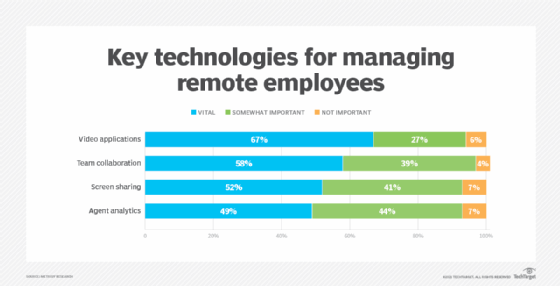
Getty Images/iStockphoto
How to train contact center agents remotely
As businesses began to work remotely due to COVID-19, contact center managers had to learn how to train contact center agents remotely. Here are seven tips to get started.
As organizations settle into their hybrid work environments, CX leaders make technology and management decisions to maximize the productivity of remote contact center agents.
As of April 2021, 73.1% of 524 organizations surveyed by Metrigy Research decided to continue with work-from-home options for contact center agents. Those organizations estimated 46.6% of agents will continue to work from home long-term. Among large organizations -- those with more than 2,500 employees -- that figure reaches 58.9%.
While remote work remains prevalent, contact center supervisors must learn to effectively train and manage remote agents. With the right technology, remote training becomes much easier.
How to manage the new normal of remote contact centers
At the start of the COVID-19 pandemic, contact center agents were unaccustomed to working without supervisors nearby. In contact center facilities, supervisors typically manage agents closely. Supervisors may walk up and down aisles of cubicles, listen to agent interactions, coach them on the spot and assist with customer problems.
Supervisors can still monitor and manage employees virtually, but it takes discipline. For example, supervisors must meet and regularly collaborate with remote agents, both individually and in teams. In addition, supervisors should also hold regular, in-person social outings, meetings or retreats, so the agent team can align on the CX strategy and feel like part of a team. Supervisors and agents in a formerly in-person world risk isolation, so in-person and virtual sessions can help.
Supervisors can use video conferencing, screen sharing, team collaboration and agent analytics applications to train and manage remote agents. Most of Metrigy's research participants said these technologies are either vital or somewhat important to manage remote workers.

Tips for remote contact center agent training
The following seven tips can teach supervisors how to train contact center agents remotely.
- Use video. Supervisors use video technology to train and coach employees. Video can also benefit individual and team meetings to enable agents to see their supervisors and discuss issues or opportunities.
- Use team collaboration tools. Supervisors may use these tools to establish team workspaces, provide training tips or act as a repository for specific topics, such as marketing campaigns, warranty terms or clients. They also use these apps for one-to-one chat capabilities.
- Use screen sharing. Supervisors should share their screens when training employees -- particularly with digital channels or analytics -- so everyone views the same content. This feature is critical for supervisors to train agents remotely, as well.
- Evaluate agent analytics. Supervisors aren't as apt to overhear remote agents' discussions with customers, so they rely more on hard data from agent analytics apps. With data, supervisors can point to key performance indicators, AI-powered performance analytics and screen or voice recordings to ensure agents meet performance requirements.
- Adopt cloud-based contact center services. Cloud contact centers can simplify how organizations implement and integrate services with collaboration platforms.
- Enhance performance with workforce optimization (WFO). WFO apps offer insight into agent performance and customer feedback. If supervisors pair those insights and share the results with agents, they can ensure agents get regular training to improve CX quality consistently.
- Ensure training is a two-way street. Supervisors often coach agents and talk for most of the meeting. But supervisors must listen to agents, as well, and understand performance declines. Is the agent struggling in the home office? Supervisors must prepare for issues like that.
How can organizations improve contact center training?
Besides adding more discipline to meeting structures and technology to support virtual collaboration, CX leaders must remember to train supervisors. Training should focus on interactions between supervisors and agents. However, management in virtual environments is new to supervisors and requires training. HR departments must provide management training to supervisors and address questions like the following:
- How can supervisors keep agents loyal?
- How can supervisors ensure agents focus on their work?
- What innovative workplace changes, such as flexible schedules, can supervisors offer?
- What legal, compliance and security issues must supervisors know when discussing potentially confidential information in unregulated, virtual locations?
If supervisors combine change management, collaboration and analytics, and have a training strategy in place, they can successfully train contact center agents remotely.





